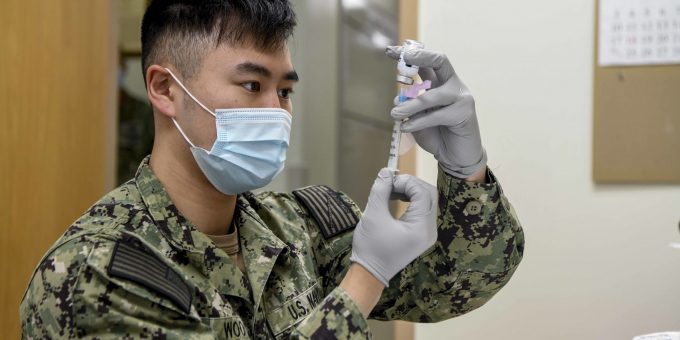
Hospital Corpsman James Woo of the U.S. Navy fills a syringe with the COVID-19 vaccine at Navy Branch Health Clinic Chinhae, South Korea. U.S. Navy Photo by Mass Communication Specialist Seaman Adam Craft, Public Domain (https://flic.kr/p/2kw1hvL)
A COVID-19 Trust Paradox
Disclosing a positive COVID-19 test result can be fraught in the best of circumstances. But in South Korea, the authors of a recent article in Social Science & Medicine find, the government itself stigmatized certain social groups through its wider releases of patient information. Consequently, the government generated a “trust paradox” in which members of these groups had to rely on the State’s services and follow its regulations while also being made more vulnerable to victim blaming.
Utilizing both media analysis and survey data, authors Ji-Bum Chung, Dahye Yeon, and Min-Kyu Kim examined who was more likely to be blamed for infecting COVID-19 and who was more likely to blame others. Their findings demonstrate that membership in certain social classes was disproportionately associated with being blamed for the pandemic. For instance, patients who were Christian were at a significantly higher risk of scapegoating because several highly publicized mass infections had begun in churches. Additionally, sexual minority patients were more likely to be accused of having COVID-19 because of widespread discrimination and prejudice against the LGBTQ+ community, a trend that was exacerbated by a superspreader event that began at a nightclub frequented by members of the LGBTQ+ community. Those doing the scapegoating, meanwhile, were found to be older South Koreans, those with more trust in the government, and those who had low knowledge about COVID-19.
Because scapegoating undermines social trust, it has deleterious effects on help-seeking, which, in a pandemic, makes public and personal health more precarious. It is natural to seek to blame individuals and groups in times of crisis and trauma, and it is imperative that governments purposefully work to build the social cohesion that, instead, helps heal.
